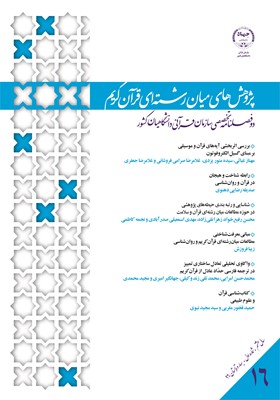رابطه شناخت و هیجان در قرآن و روانشناسی
محورهای موضوعی : قرآن و روان شناسی
1 -
کلید واژه: شناخت هیجان عاطفه قرآن روانشناسی,
چکیده مقاله :
رابطه بین هیجان و شناخت موضوعی است که توجه محققان روانشناسی را در طول تاریخ این رشته به خود جلب کرده است. در حالی که نظریههای قدیم بر مجزا انگاشتن این دو حیطه تأکید کردند، نظریههای جدید شواهد زیاد و گستردهای در ارتباط تنگاتنگ بین این دو حیطه ارائه کردهاند. هدف از پژوهش حاضر بررسی رابطه بین شناخت و هیجان در قرآن و روانشناسی است. پرسش اصلی پژوهش حاضر این است که آیا از دیدگاه قرآن و روانشناسی بین شناخت و هیجان ارتباط وجود دارد و این ارتباط چگونه است؟ از روش توصیفی ـ تحلیلی برای بررسی متن قرآن و متون روانشناسی استفاده شده و بر اساس نتایج به دست آمده از پژوهشهای روانشناسی، هیجانها و عواطف مختلفی مثل غم، شادی، خشم و اضطراب میتواند بر روی درک، قضاوت، استدلال، توجه، حافظه و تصمیم گیری افراد اثر بگذارد. از طرفی نوع قضاوت و ارزیابی افراد از محرکهای محیطی میتواند نوع، شدت و تداوم هیجان را تعیین کند. همچنین از منظر قرآن، شناخت و هیجان رابطهای دوطرفه و علّی بر روی یکدیگر داشته و جهت رفتار را تعیین میکنند. این یافته با نتایج به دست آمده از تحقیقات جدید در روانشناسی مطابقت دارد. تلویحات به دست آمده از نتایج در تفسیر آیات مرتبط با این دو مقوله، خودشناسی و تربیت دینی بحث شده است.
The relationship between cognition and emotion is a topic that has drawn psychologists’ attention throughout the history of psychology. While earlier theories emphasized the distinction between these two areas, new theories have presented wide range of evidence affirming the close relationship between them. The purpose of this study is to review the relationship between cognition and emotion in Quran and Psychology. The main question of this study is on the existence of relation between cognition and emotion and it goes. Using the analytical-descriptive, this research investigated the text of Quran and psychological texts. Based on the results achieved from the psychological studies, feelings and emotions such as grief, happiness, anger and anxiety can affect understanding, judgment, reasoning, attention, memory and decision making of individuals. On the other hand, an individual’s evaluation of environmental stimuli can determine the type, intensity and permanence of emotion. Based on the view of the Quran, cognition and emotion have mutual and casual relationship with one another and determine the orientation of behavior. This finding conforms to the new scientific findings on the relationship between cognition and emotion. Implications derived from the results have been discussed in the interpretation of the Quran verses related to the two issues of self-scrutiny and religious upbringing.
